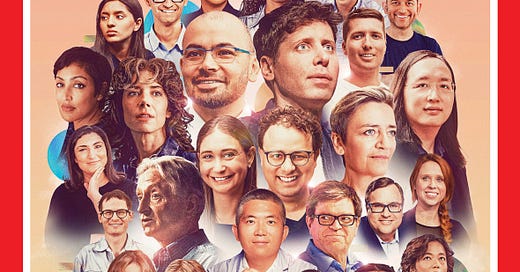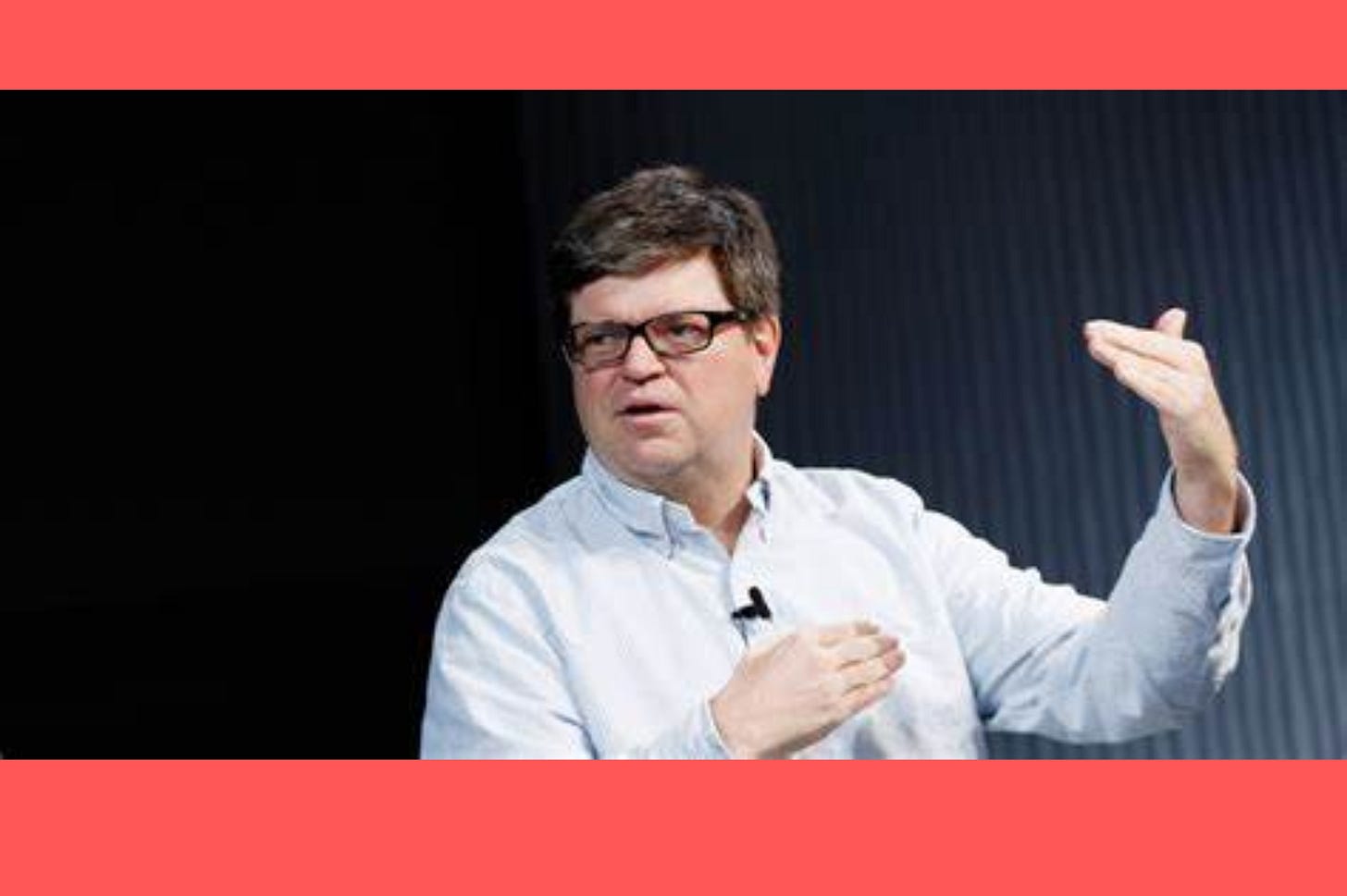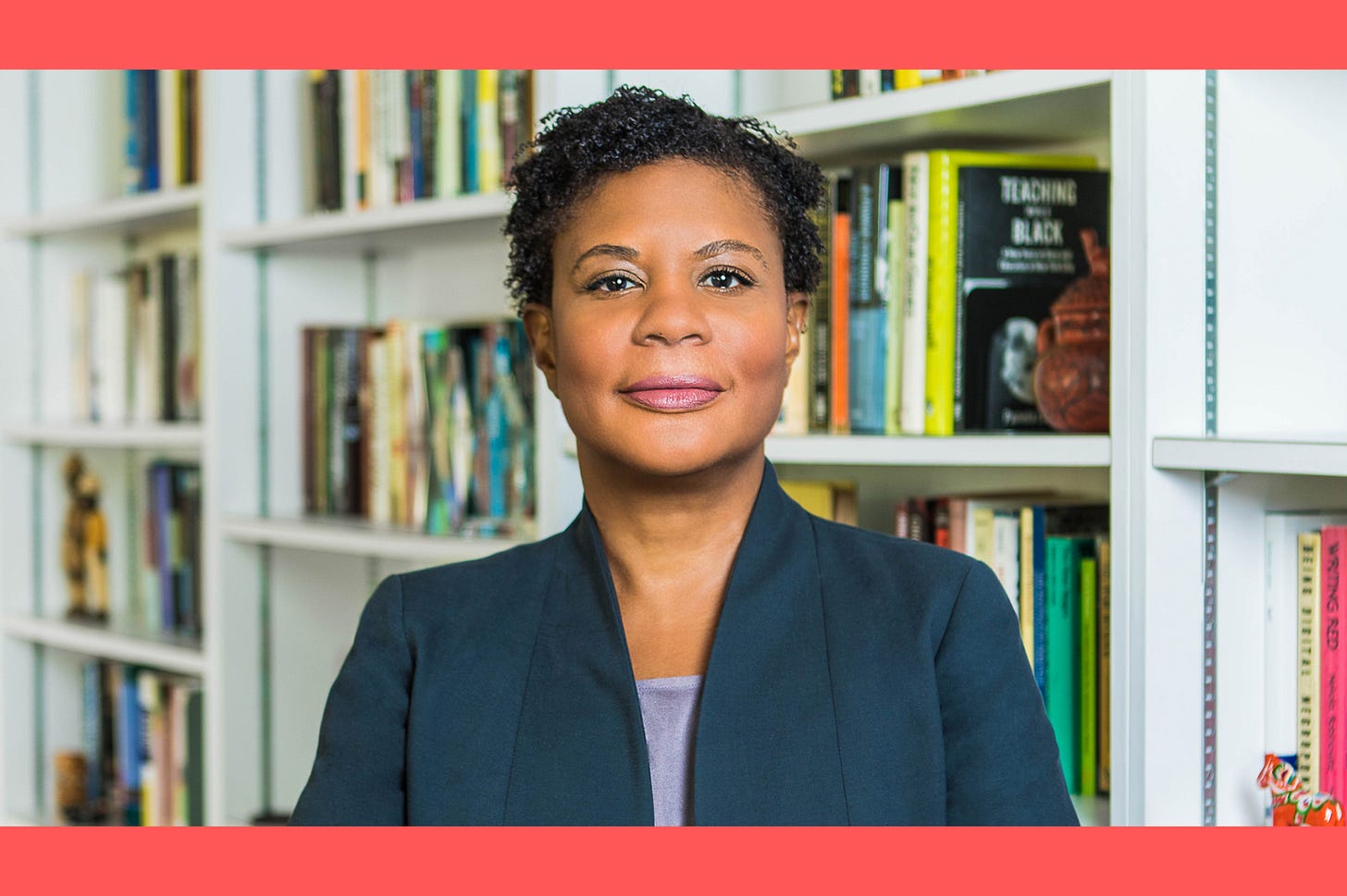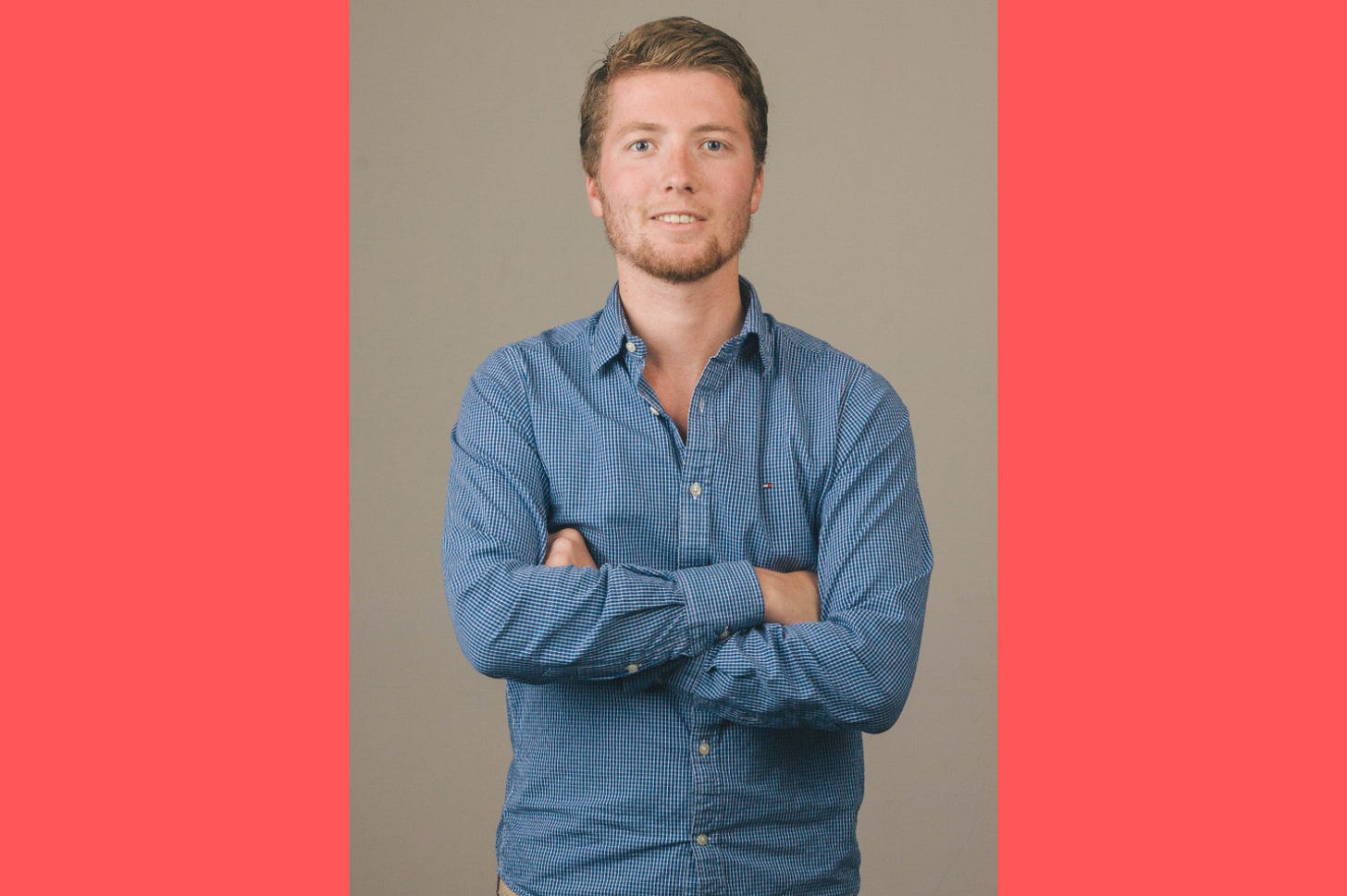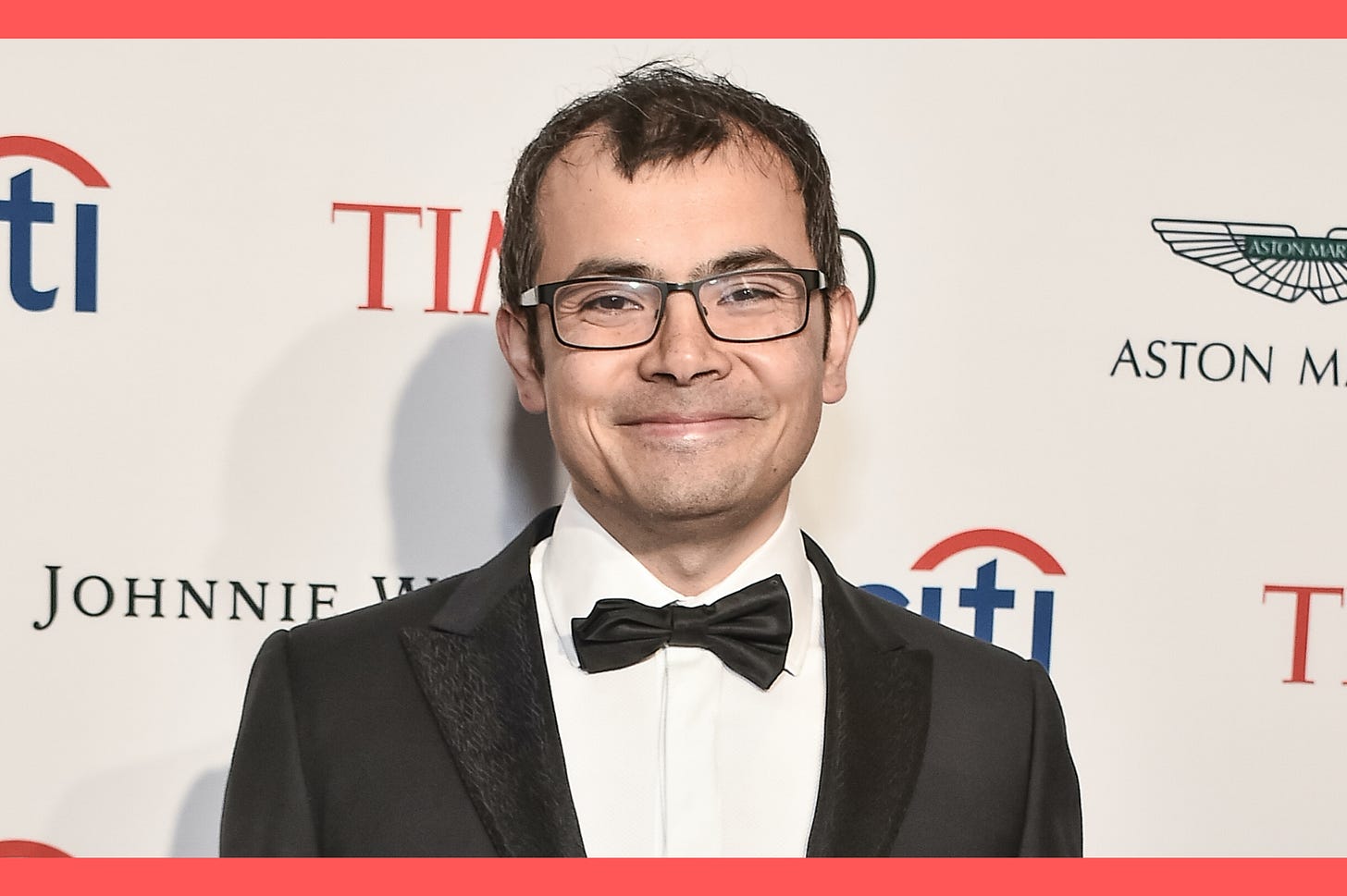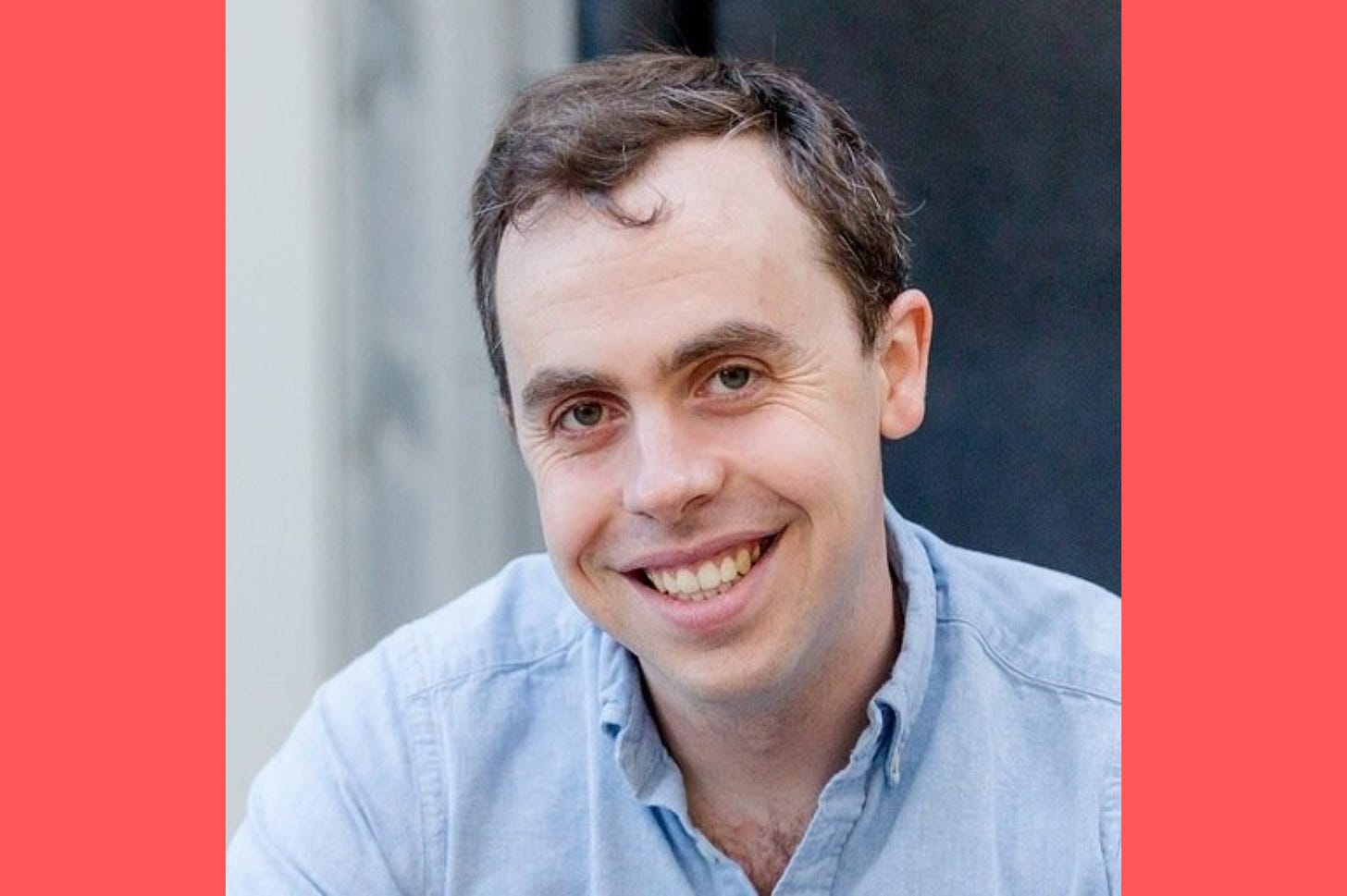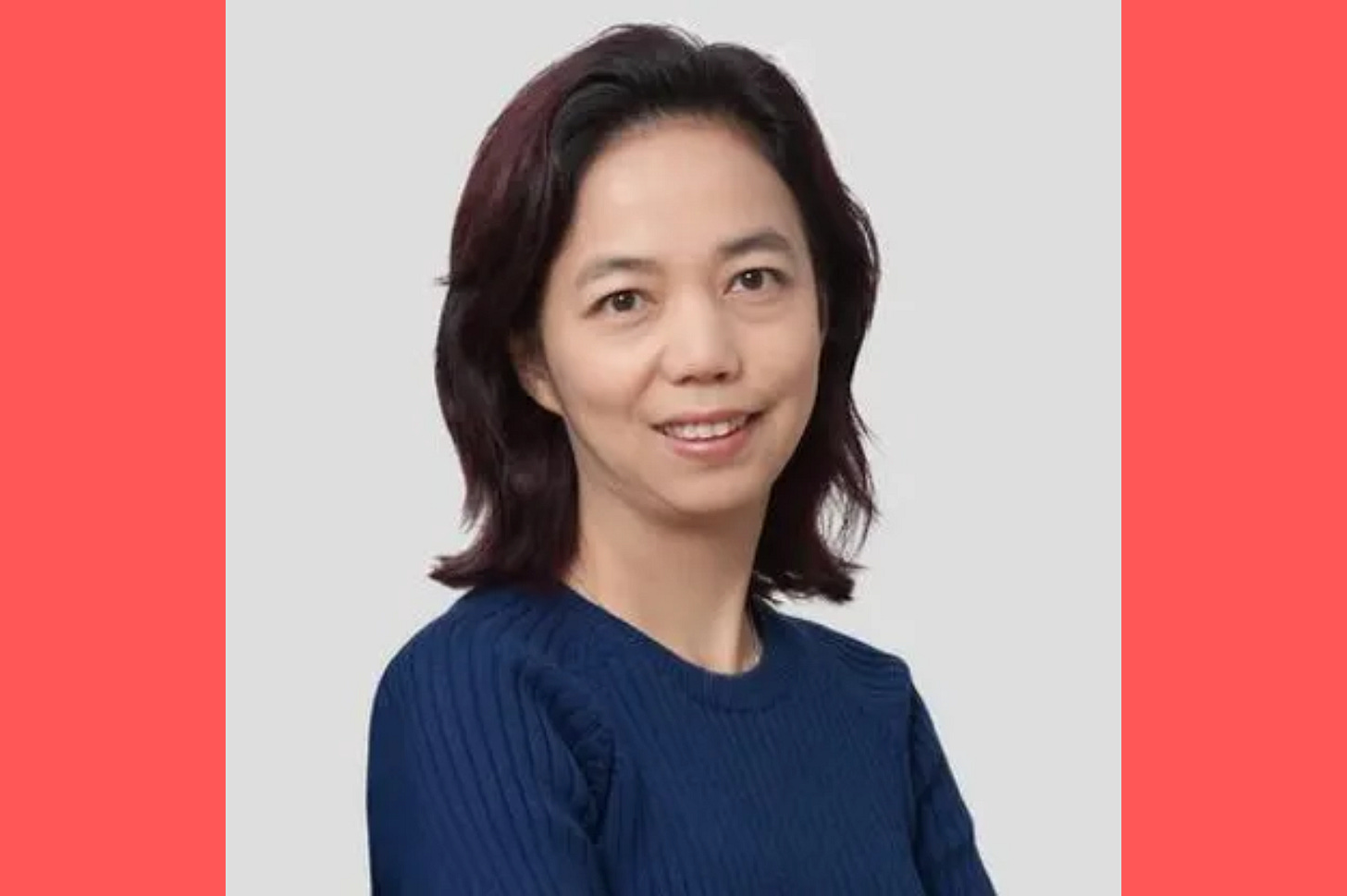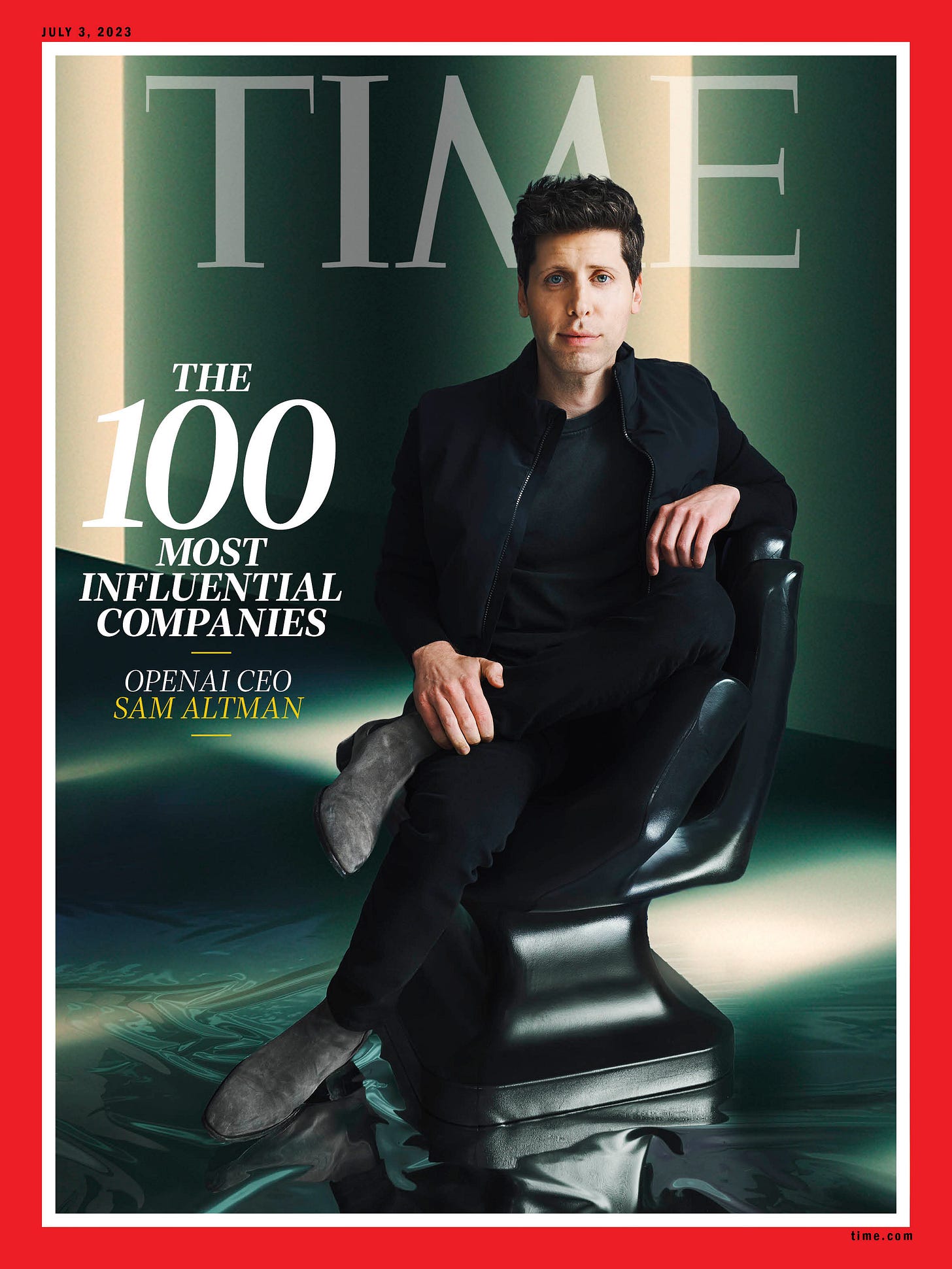Who are these People in the Time 100 AI Magazine Cover?
Plus, some insights about these toppers of AI
Well, let us play a game, shall we? How many people do you know from the above image?
Done with the guessing? How much did you get?
Well, in his post, I will introduce you to all of these people — who are they, and why they are such a big deal?
I.
Time magazine's 1st-ever Top 100 AI
SAM JACOBS, the Editor-in-Chief of Times Magazine, wrote:-
Behind every advance in machine learning and large language models are, in fact, people—both the often obscured human labor that makes large language models safer to use, and the individuals who make critical decisions on when and how to best use this technology.
Reporting on people and influence is what TIME does best.
This group of 100 individuals is in many ways a map of the relationships and power centers driving the development of AI.
The cover that you just saw is the cover for the first-ever Time100 AI list — which included the names of the top 100 people who contributed to the developments and advancements of AI.
The Times magazine, since its inception in 1923, has been covering news in various domains — National news, Health, Science, Business, and so on. Around 70 years after that (in the year 1999 to be exact) Time started its TIME100 segment — which is an annual top 100 list that contains influential people around the world, selected by the editors at Time.
The list covers various categories, such as leaders, artists, innovators, icons, and titans. The list also features special honorees, such as
the Person of the Year — an annual title awarded by Time Magazine to a person (or a group of people) who had the most significant impact on the world in the past year.
the Heroes of the Year — given to a diverse group of individuals who have made a positive impact on the world.
Next Generation Leaders — given to individuals who shape the world and define the next generation of leadership.
The TIME100 AI list includes Tech CEOs, researchers, policy advisers, and artists who have made significant contributions to AI. The list on the Times Website is sorted into four categories — Leaders, Innovators, Shapers, and Thinkers.
This list is special, not because it contains people who have contributed to AI in terms of algorithms or AI applications — as a matter of fact, most of these people are not even CEOs of Tech companies. The list also includes personalities that contribute to the intellectual, ethical, and social dynamics that drive AI’s staggering evolution.
Without further ado, let’s see who made it to the first-ever cover of TIME100 AI.
II.
The People in the Cover
(and your Answer key for the game)
Well, to make things easier, I have marked these people on the cover — so that you can refer to it easily.
Here are the names:
1. Sayash Kapoor — Professor & Doctoral Candidate, Princeton University
2. Arvind Narayanan — Professor & Doctoral Candidate, Princeton University
3. Yann LeCun — Chief AI Scientist Meta
4. Yejin Choi — Professor, University of Washington
5. Abeba Birhane — Cognitive Scientist
6. Geoffery Hinton — Emeritus Professor, University of Toronto
7. Elham Tabassi — Associate Director of Emerging Technologies, NIST
8. Meredith Whittaker — President, Signal
9. Ian Hogarth — Chair of the U.K.’s Frontier AI Taskforce
10. Alondra Nelson — Researcher at the Institute for Advanced Study and Policy Adviser
11. Pelonomi Moiloa — CEO and Co-Founder, Lelapa AI
12. Reid Hoffman — Entrepreneur and Investor
13. Clément Delangue — CEO and Co-Founder, Hugging Face
14. Sam Altman — CEO, OpenAI
15. Demis Hassabis — CEO and Co-Founder of Google DeepMind
16. Noam Shazeer — CEO and Co-Founder of Character.AI
17. Audrey Tang — Minister of Digital Affairs, Taiwan
18-20. Dario and Daniela Amodei — CEO & President, Anthropic
21. Grimes — Musician
22. Rumman Chowdhury — CEO and Co-Founder, Humane Intelligence
23. James Manyika — Senior Vice President, Research, Technology & Society, Google
24. Paul Christiano — Founder, Alignment Research Center
25. Yi Zeng — Professor, Chinese Academy of Sciences
26. Margrethe Vestager — Executive Vice President, European Commission
27. Fei-Fei Li — Professor, Stanford University
28. Verity Harding — Director of the AI & Geopolitics Project, Cambridge University
29. Sneha Revanur — Founder and President, Encode Justice
Let’s explore who they are, and why are they celebrated by the AI community.
1. Sayash Kapoor — Professor & Doctoral Candidate, Princeton University
Sayash Kapoor is a Professor and Doctoral Candidate at Princeton University. He is a leading researcher in the field of AI and has made significant contributions to the development of machine learning algorithms. He is a recipient of the best paper awards at ACM FAccT. He is currently co-authoring a book on AI Snake Oil with Arvind Narayanan.
Next up is - Arvind Narayanan.
2. Arvind Narayanan — Professor & Doctoral Candidate, Princeton University
Arvind Narayanan is a Professor and Doctoral Candidate at Princeton University. He is a renowned computer scientist who has made significant contributions to the field of AI, particularly in the areas of privacy and security. In 2019, he gave a famous talk titled “How to recognise AI snake oil” — which resulted in the creation of this sub stack →
along with . They are also creating a book on the same topic, which will hopefully be published in 2024.3. Yann LeCun — Chief AI Scientist Meta
Yann LeCun is the Chief AI Scientist at Meta. He is a pioneer in the field of deep learning and has made significant contributions to the development of convolutional neural networks, which are used in image recognition. He is well known for his work on optical character recognition and computer vision using convolutional neural networks (CNN) and is a founding father of convolutional nets.
LeCun received the 2018 Turing Award (often referred to as the "Nobel Prize of Computing"), together with Yoshua Bengio and Geoffrey Hinton, for their work on deep learning. The trio are often entitled as “Godfathers of AI” — and all the Godfathers made it to the TIME100 list. Two of them have been featured in this magazine magazine as well.
4. Yejin Choi — Professor, University of Washington
Yejin Choi is a Professor at the University of Washington. She is a leading researcher in natural language processing and has made significant contributions to the development of machine learning algorithms that can understand human language.
One of her notable works was when she developed computational models that can detect biases in language that work against people from underrepresented groups
5. Abeba Birhane — Cognitive Scientist
Abeba Birhane is a Cognitive Scientist who works as a Senior Advisor in AI Accountability at Mozilla Foundation and an Adjunct Assistant Professor at Trinity College Dublin.
She has made significant contributions to the development of auditing publicly accessible AI training datasets.
6. Geoffery Hinton — Emeritus Professor, University of Toronto
Geoffrey Hinton is an Emeritus Professor at the University of Toronto. He is a leading researcher in deep learning and has made significant contributions to the development of neural networks. He is a a leading figure in the AI community, who is known for his revolutionary work on artificial neural networks.
With David Rumelhart and Ronald J. Williams — both pioneers in the development of neural networks — Hinton co-authored a “Learning representations by back-propagating errors” paper published in 1986 that popularised the backpropagation algorithm for training multi-layer neural networks.
And if you are wondering, then yes — he is the second “Godfather of AI” featured in this list.
7. Elham Tabassi — Associate Director of Emerging Technologies, NIST
Elham Tabassi is an Associate Director of Emerging Technologies at NIST. She is a leading researcher in AI and has made significant contributions to the development of standards for AI systems.
She worked on various machine learning — predominantly computer vision and biometrics — as a member of NIST.
8. Meredith Whittaker — President, Signal
Meredith Whittaker is the President of Signal Technology Foundation, an organization that advocates for ethical AI practices. And yes, this is a foundation which is by its subsidiary — Signal Messenger LLC, that created the popular Signal messaging app.
Earlier, she worked with Google for 13 years, founded Google Open Research Group, and co-founded the M-Lab.
She has made significant contributions to the development of ethical guidelines for AI systems. She is (also) the co-founder and former faculty director of the AI Now Institute at NYU, a leading university institute dedicated to researching the social implications of artificial intelligence and related technologies.
9. Ian Hogarth — Chair of the U.K.’s Frontier AI Taskforce
Ian Hogarth is an investor and entrepreneur by profession. He is the Chair of the U.K.’s Foundation AI Taskforce — which analyses and studies the risks of artificial intelligence. He has made significant contributions to the development of policies that promote innovation in AI.
He has his own blog, where wrote a post on AI Nationalism which discusses the rise of machine learning influencing the domains of geopolitics.
10. Alondra Nelson — Researcher at the Institute for Advanced Study and Policy Adviser
Alondra Nelson is an American Academic and Researcher at the School of Social Science at the Institute for Advanced Study in Princeton, New Jersey. She has made significant contributions to the development of policies that promote equity and fairness in AI systems.
From 2021 to 2023, Nelson was deputy assistant to President Joe Biden and principal deputy director for science and society of the White House Office of Science and Technology Policy (OSTP).
11. Pelonomi Moiloa — CEO and Co-Founder, Lelapa AI
Pelonomi Moiloa is the CEO and Co-Founder of Lelapa AI, an organization that uses AI to solve social problems in Africa. The company’s first major project, Vulavula, uses AI to assist with the natural language processing of African languages that are often neglected by other researchers—Zulu, Sotho, and Afrikaans are spoken by some 25 million people. the project Moiloa is most passionate about is training AI models to properly pronounce South African names.
She has made significant contributions to the development of automated AI systems that can address social issues.
12. Reid Hoffman — Entrepreneur and Investor
Reid Hoffman is an Entrepreneur and Investor who cofounded LinkedIn in 2003. He has made significant contributions to the development of AI startups — after launching his own AI startup called Inflection AI along with DeepMind co-founder Mustafa Suleyman and former DeepMind researcher Karén Simonyan.
He made headlines in the AI community when he once said pausing AI development is 'foolish' and 'anti-humanist'.
13. Clément Delangue — CEO and Co-Founder, Hugging Face
Clément Delangue is the CEO and Co-Founder of Hugging Face, an open-source organization that acts as a platform for researchers to share their AI models, datasets, etc. with the world.
He has also co-authored many AI-related papers and has significant contributions to the development of natural language processing algorithms.
14. Sam Altman — CEO, OpenAI
Often dubbed as the poster boy in the AI community, Sam Altman is the CEO of OpenAI, an organization that develops advanced AI models — famously known for developing the ChatGPT and GPT model series. Earlier, He was the president of Y Combinator.
He has led the development of deep learning interestingly — as ChatGPT became a medium for common people to realise the true power of AI.
15. Demis Hassabis — CEO and Co-Founder of Google DeepMind
Demis Hassabis is the CEO and co-founder of Google DeepMind, a world-leading artificial intelligence research company. He is also a renowned computer scientist, neuroscientist, and entrepreneur. He has been recognized as one of the most influential people in the field of AI and has received numerous awards and honours for his contributions.
He is passionate about creating general-purpose
16. Noam Shazeer — CEO and Co-Founder of Character.AI
Noam Shazeer is the CEO and co-founder of Character.AI, a company that develops cutting-edge natural language processing technologies. He has over 20 years of experience in the field of artificial intelligence, having worked at many AI giants, such as Google, OpenAI, and DeepMind.
He is also a prolific researcher — who has more than 100 publications in top-tier conferences and journals. He is widely recognized as one of the pioneers of transformer models, attention mechanisms, and neural architecture search.
17. Audrey Tang — Minister of Digital Affairs, Taiwan
Audrey Tang is the Minister of Digital Affairs of Taiwan, a position she has held since 2016. She is a self-taught programmer, hacker, and civic activist who advocates for open government, social innovation, and digital democracy.
She is also the first transgender minister in the world and one of the youngest cabinet members in Taiwan's history. As the Minister of Digital Affairs, she is responsible for overseeing the development and implementation of digital policies and initiatives that enhance public participation, transparency, and accountability in Taiwan's government.
18-20. Dario and Daniela Amodei — CEO & President, Anthropic
Dario and Daniela Amodei are the CEO and President of Anthropic, a research institute dedicated to creating and understanding large-scale artificial intelligence systems that can align with human values and goals.
Dario is a former research scientist at OpenAI, where he led the team that developed GPT-3, one of the most advanced language models in the world.
Daniela is a former product manager at Google, where she worked on various projects related to natural language processing, computer vision, and machine learning.
Together, they founded Anthropic in 2021 with the vision of building trustworthy and beneficial AI for humanity.
21. Grimes — Musician
Grimes is a Canadian musician, singer, songwriter, and producer who has been involved in various projects related to artificial intelligence. She has collaborated with OpenAI on several occasions to spread awareness about AI.
She once co-created an AI-generated lullaby with OpenAI's MuseNet — a deep neural network that can generate music in different styles and genres— and showed the usage of generative AI in creative fields like music.
She also participated in the launch of OpenAI's Jukebox, a neural network that can generate music and lyrics from scratch or based on existing songs.
She has also explored the themes of AI, transhumanism, and the future of humanity in her music and visual art.
22. Rumman Chowdhury — CEO and Co-Founder, Humane Intelligence
Rumman Chowdhury is the CEO and co-founder of Humane Intelligence, a company that aims to create ethical and responsible artificial intelligence solutions for various domains.
She has a background in data science, social science, and business, and has worked as a senior principal at Accenture and a director of data science at Metis.
She is also a TEDx speaker, a Forbes contributor, and a member of the Forbes Technology Council. She has been recognized as one of the most influential women in AI by Forbes, Fast Company, and Wired.
23. James Manyika — Senior Vice President, Research, Technology & Society, Google
James Manyika is the Senior Vice President of Research, Technology and Society at Google, where he oversees the company's efforts to advance the state of the art in artificial intelligence, quantum computing, biotechnology and other fields.
He also leads Google's initiatives to ensure that these technologies are developed and deployed responsibly and ethically, in alignment with Google's core values and principles. James has a PhD in robotics from Oxford University and has published over 100 papers and books on topics such as machine learning, computer vision, natural language processing and human-computer interaction.
He is a member of the National Academy of Engineering, the Royal Society and the American Academy of Arts and Sciences. He is also a board member of several organizations, including the MacArthur Foundation, the Aspen Institute and the World Economic Forum.
24. Paul Christiano — Founder, Alignment Research Center
Paul Christiano is the founder of the Alignment Research Center, a non-profit organization dedicated to ensuring that artificial intelligence is aligned with human values and goals. He is also a research scientist at OpenAI, where he works on a variety of topics related to AI alignment, such as iterated amplification, debate, and learning from human feedback. Paul has a PhD in computer science from UC Berkeley, where he studied computational complexity and cryptography. He is passionate about finding scalable and robust solutions to the alignment problem and engaging with the broader AI community on these issues.
25. Yi Zeng — Professor, Chinese Academy of Sciences
Yi Zeng is a professor at the Chinese Academy of Sciences and a leading expert in the field of population ageing and health. He has published more than 200 papers and books on topics such as longevity, mortality, fertility, migration, and social security.
He is also the director of the Center for Healthy Aging and Development Studies, which conducts interdisciplinary research on the challenges and opportunities of ageing societies.
He has received numerous awards and honours for his contributions to science and policy, such as the China Population Award, the UNFPA Award, and the Ho Leung Ho Lee Foundation Prize.
26. Margrethe Vestager — Executive Vice President, European Commission
Margrethe Vestager is the Executive Vice President of the European Commission, responsible for leading the digital agenda and ensuring a fair and competitive market in the European Union.
She has been a prominent figure in the regulation of big tech companies, such as Google, Apple, Facebook and Amazon, imposing fines and enforcing antitrust laws.
She is also a former Danish politician, who served as Minister for Economic Affairs and the Interior, and leader of the Social Liberal Party. She is widely regarded as one of the most influential and respected women in Europe.
27. Fei-Fei Li — Professor, Stanford University
Fei-Fei Li is a professor of computer science at Stanford University and the co-director of the Stanford Institute for Human-Centered Artificial Intelligence.
She is a leading expert in the field of artificial intelligence, especially in computer vision and machine learning. She has made significant contributions to the development of large-scale image datasets, such as ImageNet, and to the advancement of deep learning algorithms for image recognition and understanding.
She is also passionate about applying AI to solve real-world problems in domains such as health care, education, and environmental sustainability. She has received numerous awards and honours for her research and teaching, including the IEEE PAMI Distinguished Researcher Award, the ACM Athena Lecturer Award, and the MacArthur Fellowship.
28. Verity Harding — Director of the AI & Geopolitics Project, Cambridge University
Verity Harding is the director of the AI & Geopolitics Project at Cambridge University, where she leads a team of researchers and policy experts who study the impact of artificial intelligence on global affairs.
She has a background in computer science, law and diplomacy, and has worked as a senior advisor to the UK government on AI and digital issues. She is also a co-founder of the Partnership on AI, a multi-stakeholder initiative that promotes responsible and ethical use of AI.
Verity Harding is a recognised thought leader and speaker on AI and geopolitics and has published widely on topics such as AI governance, digital sovereignty, cyber security and human rights.
29. Sneha Revanur — Founder and President, Encode Justice
Sneha Revanur is the founder and president of Encode Justice, a nonprofit organization that aims to empower marginalized communities through technology and education. She is passionate about using data science and artificial intelligence to address social issues such as criminal justice reform, human rights, and environmental justice.
She has led several projects and initiatives that leverage data and technology to amplify the voices of the oppressed and advocate for change. She is also a speaker, writer, and mentor who inspires others to use their skills for good.
III.
Some Interesting Facts about the Toppers of TIMES100 AI list
Before I sign off, I want to present some interesting observations of these people who made it to the list of Time100AI (all 100 people - even those who didn’t make it to the cover of the magazine) -
In terms of Nationality, there are more Americans on this list — with the number of individuals being 11. Then it’s the people of British, China, and Australia tied up in second place — with the number of individuals being 4 from each country.
Needless to say, in terms of continent, North America has produced more of these AI toppers, with Europe being the second. Third is, of course, Asia.
Geoffrey Hinton is the oldest individual on the list, with the age of 75 years.
Sneha Revanur is the youngest individual on the list, with the age of 18 years.
Not all individuals on this list are known. Rootport is a pseudonymous author of Japan’s first AI-generated Manga, titled Cyberpunk: Momotaro.
Also, Read posts similar to this:
See you all in the next post.

